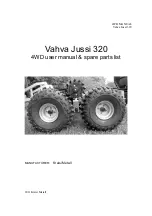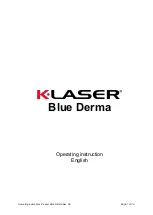
Bilateral Variation I:
Place a rubber ball between the knees. Medialis muscles are necessarily involved to keep the
ball in place. The ball should not rotate if both limbs are pressing equally hard.
Unilateral OR Bilateral Leg Press Variation I:
Leg Press with Theraband (pulling laterally on one or both knees)
Attach a Theraband from the patient's knee to a hard point to the right or left of the knee. This will
activate the lateralis of either limb.
Page 22
Summary of Contents for MiniPress
Page 2: ...Page 2 ...
Page 4: ...Page 4 ...
Page 7: ...Page 7 ...
Page 14: ...Page 14 ...
Page 36: ...Variation Add a stability ball between hands and Footplate Page 36 ...
















































